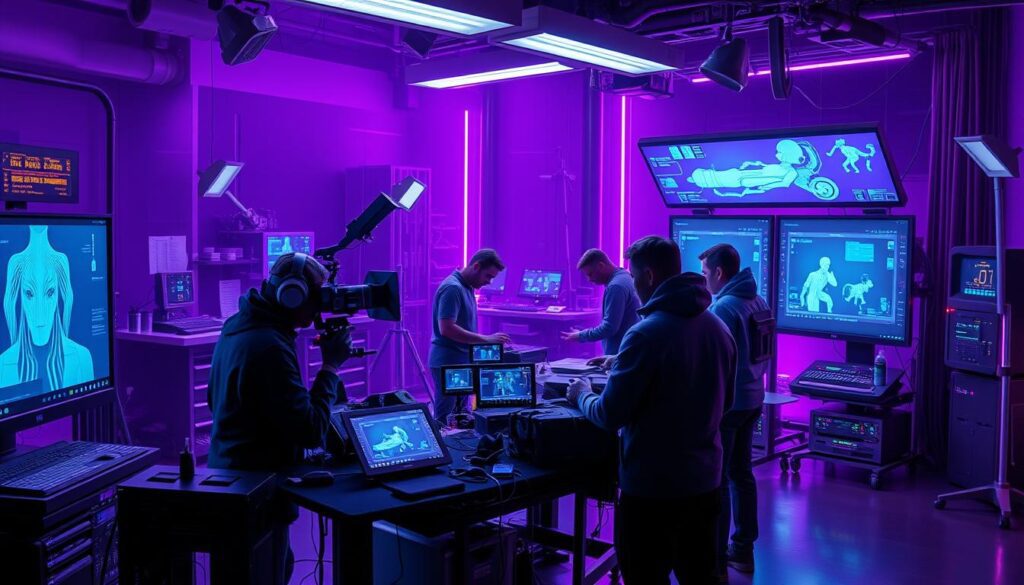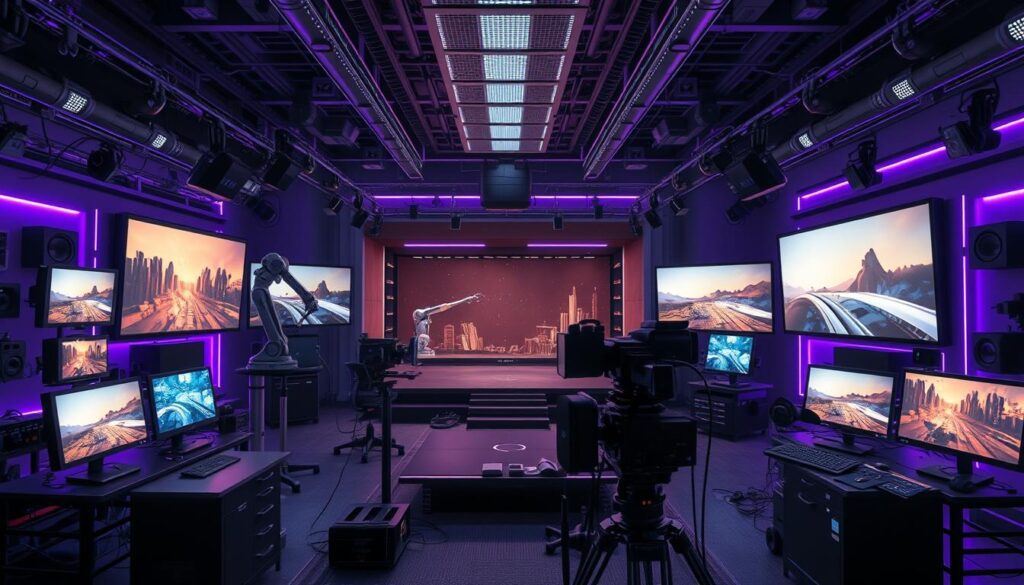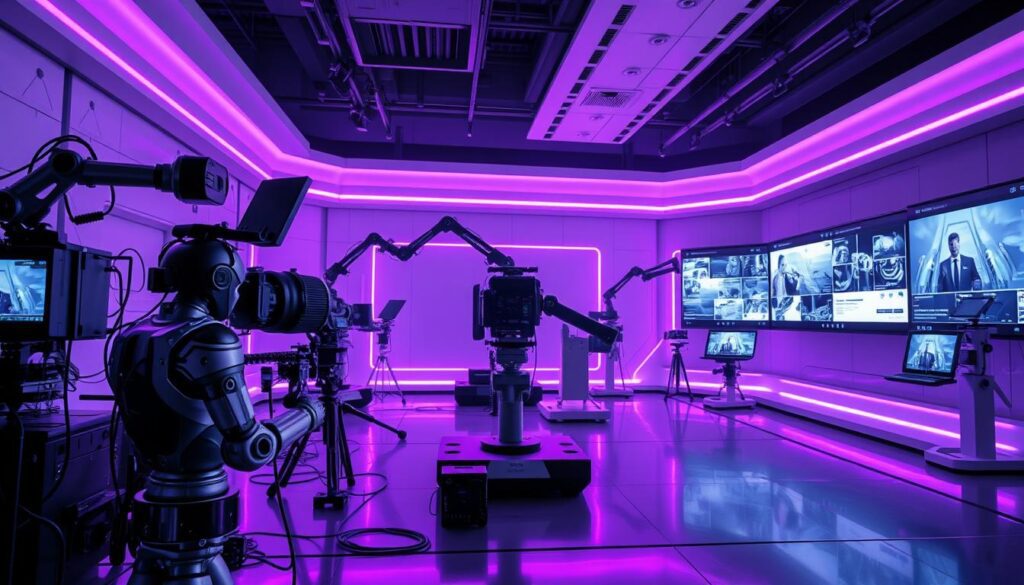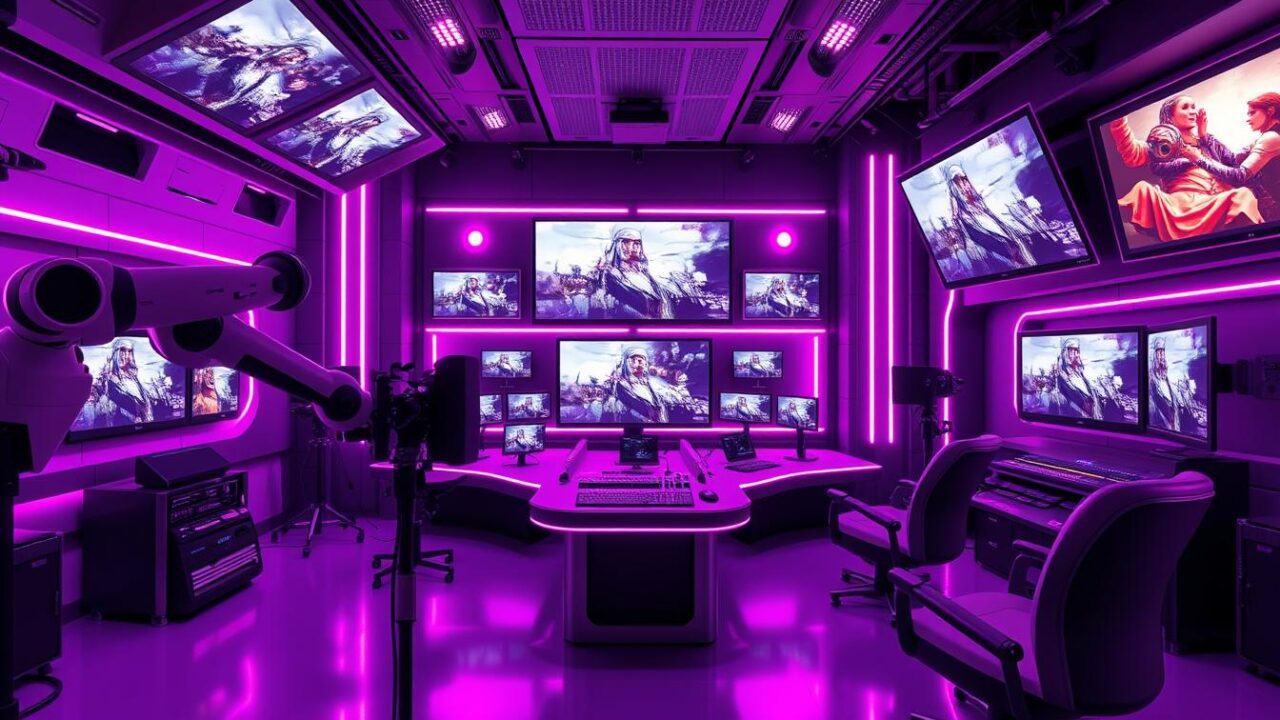The global artificial intelligence market reached $454.12 billion in 2022. North America led with $167.30 billion. This growth is changing many industries, including filmmaking. We’re seeing a big change in how AI is used in movies, making them faster to make.
AI is growing fast in many areas. Gartner says more companies are trying out generative AI. This change will greatly affect the film industry, especially with new video editing tools.
AI is changing filmmaking a lot. It’s not just small changes. It’s a big change in how movies are made, from start to finish. AI is making movies faster and opening up new creative ideas.
Key Takeaways
- AI market valued at $454.12 billion in 2022, led by North America
- 44% of organizations are piloting generative AI
- AI in filmmaking promises to dramatically reduce production times
- Machine learning video editing is transforming post-production processes
- AI integration in film production is becoming increasingly inevitable
- Creative possibilities in filmmaking are expanding due to AI advancements
The Impact of AI on Hollywood Craftspeople

AI is changing Hollywood, bringing both excitement and worry. Deep learning and neural networks are changing how movies are made. This change is affecting the creative workforce.
Concerns of Editors and Artists
Many in Hollywood are worried about their jobs as AI gets better. Picture editors fear AI could cut their work by a third. The use of computer vision in movies might make some jobs less needed.
But, recent data shows a different story:
- 96% of AI decision-makers in media plan to increase AI spending
- Only 4% expect job displacement from AI adoption
- An estimated 62,000 California entertainment jobs may be disrupted by AI in three years
The International Alliance of Theatrical Stage Employees recently approved a contract for AI use. This decision sparked debate among workers about job losses. Meanwhile, some companies see AI as a way to work faster. A Netflix job listing for a machine-learning manager offered a salary range of $300,000 to $900,000.
Unions are taking steps to protect their members. The Writers Guild of America and SAG-AFTRA secured protections against AI replacement after strikes. Yet, some SAG-AFTRA members criticize the deal for not limiting “synthetic performers” enough.
“The rise of AI in Hollywood is a double-edged sword. It offers incredible creative possibilities but also challenges traditional roles in the industry.”
As AI keeps evolving, its impact on Hollywood craftspeople is a big topic. The balance between innovation and job preservation will shape the future of filmmaking.
The Rise of Generative AI

Generative AI has changed the world, making big waves in many industries. In 2024, it’s being used more than ever before. This tech is changing how we make movies and other visual content.
The film world is using ai to make production smoother. Generative AI can make very realistic images and videos. This is helping make movies faster and cheaper.
AI is also great at making pictures and videos that look real. It can even create paintings in different styles. This is super helpful for making product designs and ads look good. Plus, it’s making music and sound effects that sound like they were made by humans.
- AI models generate high-quality text content
- Creation of images from text descriptions
- Automated tasks in product and graphic design
- AI-powered short video clip generation
But AI’s impact isn’t just in movies. It’s helping find new medicines and making medical images. It’s also making learning more personal for students.
Looking ahead to 2024, the future of AI in movies looks very exciting. It will change everything from writing scripts to making special effects. This will bring a new level of creativity and speed to making movies.
Core Generative AI Tools and Technologies

The world of making movies is changing fast. New tools are coming out to make making movies quicker in 2024. These technologies are changing how films are made.
Notable Tools Leveraging Generative AI
Generative AI is big in the movie world. Tools like ChatGPT and AlphaCode help with scripts and planning. Mid Journey and DALL-E 2 make amazing visuals. Copilot and CodeGPT improve the technical side of making movies.
Machine learning video editing tools are changing the game. They make boring tasks easier, so editors can be creative. This makes editing faster and cheaper.
AI Audio Creation Tools
AI is also changing how we make sounds for movies. Murf.ai and others create real voices for voiceovers and dubbing. These tools help make movies in many languages fast and cheap.
AI tools are changing the movie industry. A survey found 27% of U.S. media leaders think AI will make work better. This change is making new roles for animators and voice actors.
“Generative AI could greatly reduce busy work in filmmaking, potentially lowering costs and production time.”
Looking forward, AI’s role in making movies faster is huge. As AI gets better, we’ll see even more tools to make making movies easier.
AI can reduce movie creation time in 2024
The film industry is changing fast with AI. Deep learning and neural networks are making movie-making quicker. Now, making movies, especially short ones and adding visual effects, takes less time.
Short Film Creation using AI
AI is changing how we make short films. “The Frost,” a 12-minute movie, was made almost entirely with AI. The team used DALL-E 2 and D-ID to make images come to life.
This method lets directors create perfect scenes in minutes. It’s a huge leap forward in making movies fast.
FX using AI reducing time and man hours
AI is also making visual effects better and faster. It helps with complex scenes and postproduction. This means less time and effort for these tasks.
In 2023, 55% of companies used AI in their work. This number is likely to grow in the film world. It will make making movies quicker and more efficient.
AI in filmmaking is not just about speed. It also opens up new creative ideas. Filmmakers can now try things they couldn’t before because of cost or time. As AI gets better, we’ll see even more creative uses in movies in 2024 and later.
Generative AI in Software Development
Generative AI is changing software development, making developers much more productive. It’s leading to a new way of working that’s transforming filmmaking.
Developer Insights
Studies show developers using AI tools like GitHub Copilot are 55% faster overall. They’re 96% quicker with repetitive tasks. This is key for making filmmaking easier, letting creators focus on their art.
Productivity Gains
ThoughtWorks reports a 10-30% productivity increase for developers using AI. At HatchWorks, AI has boosted client productivity by 30-50%. These gains are making filmmaking more efficient and accessible.
AI’s impact goes beyond just writing code. It’s changing how movies are made, from script to final cut. This change is making filmmaking faster and cheaper.
“AI is not just a tool; it’s becoming an integral part of the creative process in filmmaking.”
Looking ahead, AI and human creativity will shape the film industry’s future. Together, they’ll open up new ways to tell stories and create visual effects. This will take cinema to new heights.
Key Statistics and Trends
The film industry is changing fast with ai reduce movie creation time in 2024. A Wall Street Journal report shows AI can now help with storylines, characters, and dialogue. This change is making a big impact on how movies are made.
In 2022, “Everything Everywhere All at Once” won an Oscar and used AI. This was a big moment for Hollywood and technology. The AI market grew from $136.55 billion in 2022 to $407 billion by 2027. This shows AI is growing fast.
Machine learning video editing is becoming more popular. 56% of businesses use AI to get better. Companies are pushing to use AI, especially in editing, to save money and work faster.
- 35% of businesses use AI for making content
- 22% of firms are quickly adding AI to their work
- 80% of retail leaders plan to use AI by 2027
These numbers show AI’s big role in many fields, including movies. As we go on, AI will keep changing how we make movies.
The Future of Generative Video
Generative video is changing fast, pushing limits in deep learning and computer vision. It’s changing how movies are made and how we watch them.
AI in animated movies is getting smarter. Now, AI can make short videos. But it’s getting better fast. Filmmakers are trying new things, like making videos look like storyboards or mixing different clips together.
The ad world is leading this change. Companies like Waymark use AI to make video ads quickly. This could get even better, with AI making longer, more connected videos soon.
Big studios are paying attention. Lionsgate teamed up with Runway AI to make a model from 20,000 movies over 27 years. This could save them a lot of money, says Lionsgate’s Vice Chairman.
- 65% of Fortune 500 firms use Vyond’s platform for animated videos
- Over 65% of US marketing professionals have experimented with generative AI
- Disney has set up a taskforce to study generative AI in entertainment
As tech gets better, we’ll see new ways to tell stories in movies and ads. The future of generative video looks very promising for both creators and viewers.
Challenges and Limitations
AI studio workflow optimization faces big challenges in 2024. Data-driven filmmaking aims for efficiency but has major limits. AI has trouble making characters look and feel real, often making them look odd.
The automated movie pipeline can only handle short clips, not full-length movies. This makes it hard to use in regular filmmaking. There are also legal worries about using copyrighted images in AI training.
Examples like “The Frost” and “Synthetic Summer” show AI’s strengths and weaknesses. These films show what AI can do and what it can’t. This makes some studios think twice before investing in AI.
“AI in filmmaking is a double-edged sword. It offers incredible possibilities but comes with its own set of challenges that we’re still learning to navigate.”
Despite these issues, the film industry keeps looking into AI’s potential. We’re working to make AI better at handling complex scenes and longer stories. The goal is to improve technology while keeping art and law in mind.
Artistic Exploration and Experimentation
Filmmakers are exploring new ways to create with artificial intelligence. We’re seeing more innovative projects that use AI to speed up movie making in 2024. These new approaches are changing the film industry, opening up fresh ways to tell stories and show visuals.
“The Frost,” a 12-minute film, was made entirely by AI. Waymark, a video company, used OpenAI’s DALL-E 2 for all shots. This shows how AI can make movie making faster.
Private Island, a startup in London, uses AI like Stable Diffusion for editing and effects. They’ve made funny commercials with AI, showing its use in different types of videos. This new technology is changing how videos are made, making it easier to try new things.
AI’s impact isn’t just in movies. At the 22nd Kinoteka Polish Film Festival, AI helped with poster design. A designer made hundreds of images in just six hours, a task that used to take much longer.
“AI tools have allowed us to push creative boundaries and explore ideas at an unprecedented pace,” remarks a leading industry designer.
Looking ahead, AI in filmmaking will keep growing. Creators are using AI in music videos and commercials too. While there are still challenges, like copyright issues, AI’s role in film is clear and exciting.
AI Impact on the film industry
The film industry is going through a big change thanks to deep learning visual effects and computer vision cinematography. AI tools are changing how movies are made, from start to finish. We’re seeing more realistic and engaging visuals in animated movies.
AI is making filmmaking easier in many ways. For example, 20th Century Fox used AI to analyze Logan’s script. This helped them make better choices about the movie’s story. Warner Bros. teamed up with Cinelytic to use AI for casting, looking at an actor’s value to guess a film’s success.
In post-production, AI is making a big splash. Disney’s FaceDirector software was used in Avengers: Infinity War to tweak actors’ performances. The Irishman used AI to make actors look younger. These advancements in deep learning visual effects are changing what’s possible in movies.
AI is not just a tool, it’s becoming a collaborator in the creative process.
Neural networks for animated movies are also getting popular. They help create realistic characters and settings faster. This tech is great for music videos and commercials because it works well for short sequences.
Computer vision cinematography is another area where AI is helping. It analyzes footage, finds key shots, and suggests camera angles. This saves time and makes storytelling better.
As AI keeps getting better, we’ll see even more cool uses in filmmaking. From AI-written scripts to automated editing, the future of movies looks smart and efficient.
Conclusion
Looking ahead to 2024, AI is changing the movie industry in big ways. AI is now making films faster and more efficiently. It’s also making movies more personal by using data to guide what we watch and how we see it.
The AI in media and entertainment market is growing fast. It was worth $10.87 billion in 2021 and is expected to grow even more. This growth is because AI makes movies better for us, makes content just for us, and makes making movies easier.
Even though there are still challenges, AI is making movies better and faster. As we move forward with AI, we must make sure it helps everyone in the industry. With AI, we can make movies that are more exciting and personal, while also saving time and money.
Want to hire me as a Consultant? Head to Channel as a Service and book a meeting.

